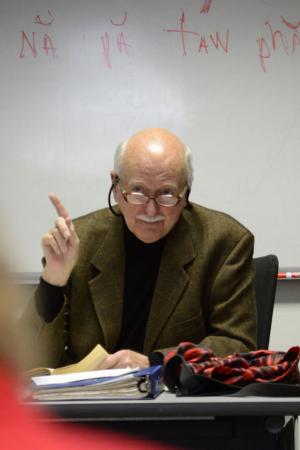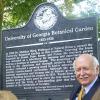Dr. Mac Is Back
Catching Up With The Quintessential Southern Lit Teacher

It’s a Friday afternoon, and Dr. Hubert McAlexander is sitting at the head of a full classroom, joking with the students before the day’s session on William Faulkner’s Absalom, Absalom! begins. After loudly shushing them, he demands that someone tell him in only one word what chapter five is about. “Reconstruction” is one student’s guess.
“Interesting, but no,” McAlexander says.
“Infatuation” is another’s.
“That’s part of it.”
“Adolescent angst,” says a third student.
“Now, that’s very good! But it’s not in one word, so I shouldn’t be praising you.”
The Local Legend
This scene may sound familiar to the many Athenians who took McAlexander’s wildly popular classes on Southern literature in the past few decades, but a few details have changed. This class meets not in Park Hall, but in the River’s Crossing building on College Station Road, and its students are a little older than the average undergraduate—the class is one of the offerings of the Osher Lifelong Learning Institute (formerly Learning in Retirement, Inc.), a member-led organization for adults in Athens that organizes classes, activities and travel groups. Because McAlexander’s voice was affected by the two strokes that he has suffered since 2009, a microphone sits on the desk in front of him; his infectious, cackling laugh booms through a static-y speaker in the back of the room. But the discussion is as lively and intellectually challenging as any honors seminar while the class parses Faulkner’s portrayal of gender, sexuality and love in Rosa Coldfield’s narration. Several students remain after class ends and continue the discussion.
McAlexander, who taught in the English department from 1974 until his health problems caused him to retire in 2010, became a local legend to generations of students for his outrageous sense of humor, dapper fashion sense and memorable lectures on American literature.
“If dapperly dressed—seersucker suits, my God, he wears seersucker suits!— silvery balding, brilliant, achingly witty men do it for you, then take this class,” gushed one student on RateMyProfessor.com about his Southern literature course.
“He changed my life, and I still think of his class quite often,” wrote another anonymous commenter.
Despite a reputation for being stingy with "A"s, McAlexander developed something of a cult following during his tenure at UGA, and despite his absence from Park Hall, he is still well known to students.

The Stand-Up Teacher
In many ways, McAlexander approximates the living embodiment of the Platonic ideal of a Southern-lit teacher, with his thick Mississippi drawl and twinkling blue eyes, neat white mustache and courtly manners, though he says it was only a seersucker coat he wore, not a whole suit. He often makes points by telling long, funny stories filled with dialogue. Some people claim that he’s distantly related to Faulkner, to whom he bears a somewhat uncanny resemblance in profile. He grew up only 30 miles away from Faulkner’s home in Oxford, and there’s even a crumbling plantation house in his own family’s relatively recent past.
But McAlexander isn’t particularly interested in these similarities. “He’s just so strange,” he says of Faulkner. “I’ll never understand certain things about him.” And any physical resemblance is coincidental. Though McAlexander’s Southern roots are a strong part of his identity, they’re only a small part of the picture.
What many former students remember about McAlexander is his irreverent sense of humor. One long-ago student told McAlexander years later that he’d never forget him strolling into the classroom on the first day of school with a dark look on his face, a lit cigarette in one hand and a Coke in the other, and shouting at them never to chew gum in his class.
“I don’t remember that,” he says. “But it sounds like something I would do!” He laughs gleefully and widens his eyes, tipping his head back, a gesture he often repeats.
John Weatherford, who worked with McAlexander as an undergrad and as a graduate student says that if McAlexander hadn’t been a teacher, he would have made a great stand-up comedian. Bob Krask, who also took many classes from McAlexander while working on his B.A. and M.A., remembers his demonstrating for the class the duck-like waddle that an old girlfriend from home had developed in the years since he’d seen her. “And then he segued abruptly, yet somehow seamlessly, to Faulkner.”
The Open Mind
But this flair for physical comedy never detracted from his seriousness about literature. McAlexander says that he never tired of teaching the same classic works by Faulkner, Henry James, Willa Cather, Eudora Welty and other great authors, and his enthusiasm is obvious. He delighted in seeing bright, open-minded young students encountering these works for the first time and trying to understand them, and says that he often saw new things in the works himself as a result of students’ insights.
Krask recalls McAlexander’s ability to encourage students but also challenge them. “Even though he’s well read and very knowledgeable, he recognizes that he can always learn something new, and is careful to create an open atmosphere in which discussion and new ideas can thrive. He’s careful to distinguish between quality answers and vacuous or misguided responses, and he makes these distinctions clear to his students.”
As McAlexander comments to the Osher group, “With students, you need to rain on their parade every chance you get, because they need to know which things are wrong and which things are right.”
To McAlexander, engaging with great literature was always the point, and wrestling with the questions it poses about human values and life’s meaning. He invokes a quote from Willa Cather’s The Professor’s House, one of his favorite novels to teach: “The fact is, the human mind, the individual mind, has always been made more interesting by dwelling on the old riddles, even if it makes nothing of them.”
Lori Jones, a Ph.D. student who worked with McAlexander, remembers the energy of his class discussions and was inspired by his teaching style. “I’m a person who likes to read and grapple with a text, and I think watching him teach and conduct a class reminded me that doing just that is entertaining and enriching and worthwhile. He reaffirmed my vision of what a literature class should be like.”
Over his career, McAlexander was recognized with many teaching awards, including Outstanding Honors Professor in multiple years and the Josiah Meigs Distinguished Teaching Professorship, UGA’s highest honor for teaching.
The Teacher’s Beginnings
McAlexander knew from a young age that his ambition was to become a college professor, though he says he’s not sure how the idea entered his head, given that growing up in the tiny town of Holly Springs, MS, he never came into contact with one. His inspiration may have come in part from his high school English teacher, Clara Carr Olson, a gifted educator who earned her degree from the University of Kansas in the early 20th century, and who, McAlexander now speculates, might very well have become a professor herself if she hadn’t been born in a time when women’s career options were highly constrained. And while McAlexander’s parents and siblings didn’t share his interests, they left him free to spend hours reading classic British novels by Dickens and Thackeray and contemporary war novels, such as those by Herman Wouk and James Jones. Even in a town with a population of about 3,500, there were many talented people who were interested in the life of the mind, and McAlexander was able to make friends with kindred spirits. The adults around him encouraged his interest in teaching, and by the time he was in 10th grade they allowed him to act as a substitute teacher in his own classes.
McAlexander entered the University of Mississippi after high school and graduated in 1961. He soon returned as a graduate student in English, and he taught his first college class in 1963, at the age of 23.
“I looked about five years old!” he says now with a laugh.
He liked teaching as much as he thought he would, and even though he soon acquired a reputation for being a hard grader, he won the respect, and in many cases the friendship, of his students. He recalls that in one of his very first classes two boys were sitting in the back snickering and looking surly and that he put on a blustering show of being a strict disciplinarian in fear of losing control of his class. Decades later, the same two men, still friends with each other, called McAlexander up one night while they were drinking, to say hello and ask how the years had treated him.
The South and the Southerner
McAlexander began his teaching career during a turbulent time at the University of Mississippi and in the nation at large. The university was integrated in 1962, only with the intervention of the federal government and the National Guard. The admission of the first African-American student, James Meredith, was accompanied by riots that left two dead and more than 160 injured. McAlexander remembers returning to the school to drop off a date after they’d attended an out-of-town sports event and seeing angry locals who were not usually on campus. He returned to his apartment and didn’t learn about the extent of the violence until the next day, when he went home and was greeted by his very worried mother. In 1966, he was informed that he was no longer eligible for student deferral from military service, and he was drafted into the Army Reserves. Though he was fortunate in never being sent to Vietnam, he went through basic training and had to attend monthly meetings; insensitive acquaintances asked if they could have his things if he was sent to war. Yet despite all this upheaval, his memories of this period seem mostly to revolve around teaching and studying, and they seem to be largely positive. He kept in touch with many of his students from this period, including one man who went on to become a Mississippi senator, and a young African-American woman who went on to become an English professor at Fort Valley State University.
Wanting to finish his Ph.D. in a more prestigious program, McAlexander transferred in 1969 to the University of Wisconsin. Though his gregarious personality won him friends, his thick Southern accent at times brought out the prejudice of classmates who expected all white Southerners to be like the thugs in Easy Rider.
“You just don’t care what anyone thinks of you, do you?” one remarked, referring to the way McAlexander spoke. When he met his future wife, Patricia, a fellow doctoral student from upstate New York, some of her friends wanted to know if he was a “bigot.” He and Patricia married, and he completed his dissertation on Faulkner, which helped him land his first teaching job at Texas A&M. Unfortunately, many universities at that time had official or unofficial policies against hiring family members or spouses, and Patricia McAlexander was unable to use her own Ph.D. to teach even freshman composition. A year later, his advisor recommended him for an open position at UGA and he was invited to apply. The school had no anti-nepotism policy and seemed more hospitable to a dual-career couple. In 1974 they moved to Athens.
The Literary Biographer
Things weren’t immediately easy, although McAlexander continued to love teaching. His dissertation had impressed his advisors and given him a reputation for being unafraid of taking on the big names in literature, but the 1970s saw a huge glut of Faulkner scholarship, and he realized after a frustrating period of revision that he was unlikely to be able to publish the manuscript as a book, a crucial milestone in an academic’s career. He and Patricia also realized that even if the university did not officially discriminate against academic spouses, the English department at that time was less encouraging than they’d hoped.
But a breakthrough came when he was asked to review a slim biography of Sherwood Bonner, an iconoclastic woman writer and feminist who lived in the mid-1800s, and who happened also to hail from Holly Springs. McAlexander found the book poor and was inspired to begin researching his own biography of Bonner.
“I thought, well, how many biographies of Sherwood Bonner does the world need? And I decided, at least one good one.”
In this way, he stumbled on the world of literary biography and found that he enjoyed the process of archival research and interviewing. Patricia McAlexander ended up changing her focus from early American literature to developmental writing, a field that was beginning to flourish, and she was hired in the program that is now the Division of Academic Enhancement. Both McAlexanders ultimately went on to become full professors in their departments, publishing books and articles and winning honors. Their son, Edward, was born during their early years in Athens, and they found the town to be a good place to raise a child.
In the 1980s, McAlexander met Peter Taylor, a famous Southern author whose life and relationships intersected many of the important literary movements of the 20th century. Thus began the research that would occupy much of McAlexander’s adult life and result in Conversations with Peter Taylor in 1987 and Critical Essays on Peter Taylor in 1993. Taylor became a friend, and McAlexander came to know him well during the author’s last years. His 2001 biography of Taylor was widely praised, leading to a Pulitzer Prize nomination in biography, among other honors.
The Old Riddles
When he left UGA, McAlexander’s retirement party was held at the 40 Watt Club. Graduate students created a vintage-inspired poster from a photo of McAlexander looking dashing in a suit, holding a glass of wine and throwing his head back in his signature gleeful laugh. Attendees shared decades’ worth of McAlexander stories and drank to his health.
“My teaching career wasn’t exactly cut short,” he says. “I was almost 70 when I had my stroke. But who knows how long I would have gone on. I liked it so much.”
McAlexander has recovered many of the abilities he temporary lost with his second stroke; at first, he couldn’t button his shirt or write his name, though now he’s back to writing and typing, doing research for a family history and working on essays for a book on Athens history. But he does have to take things much easier, and at times the side effects from his medications slow him down. It’s not apparent from looking at him that he’s survived a stroke. But the quality of his voice has changed, becoming hoarser and sometimes louder or softer than he intends, something he and Patricia laugh about. He’s supposed to drink a lot of water. He doesn’t downplay the seriousness of his health problems (he’s also a cancer survivor) but he maintains his typically sunny demeanor for the most part and seems to find humor in the absurdities illness can create.The class on Absalom, Absalom! is the third McAlexander has taught for the Osher institute. He has also led courses on Faulkner’s As I Lay Dying and on Cather’s The Professor’s House. The students in Friday’s group bring the perspectives of full lives to the discussion of the novel. One man says that he was curious how the women in the class would perceive Faulkner’s depiction of adolescent girls, whether they would feel it was sexist or distorted; one woman replies that in certain passages she feels that Faulkner gives voice to emotions she experienced in her own youth and had never been able to put into words. Other Spring 2013 Osher classes (olli.edu.uga/courses/) focus on Macbeth, the Alfred Dreyfus affair, French New Wave Cinema and the science of climate change, to name just a few of its offerings. (Lighter fare is offered as well.)
As Hubert McAlexander and his fellow Osher students and teachers show, even after college is over there’s always the possibility of encountering those who love knowledge and “dwelling on the old riddles.”
More by C. J. Bartunek
-

Chapter 13: A Wild Rumpus
The Athens of Georgia
In the low lighting of the 40 Watt under the string lights and spooky streamers, his Machiavellian impulses were confused.
-

Remembering UGA's First Botanical Garden
A Garden of Eden
Just a few traces remain, but now the old botanical garden has a new marker.
-

Chapter 12: Fright Night
The Athens of Georgia
Why was he still in Athens? His life there obviously sucked.









comments